The opening session of the 30th Arab Summit ended on Sunday in the Tunisian capital after the conclusion of speeches by Arab leaders reaffirming their support for the Palestinian cause and rejecting the US's recognition of Israeli sovereignty over the occupied Golan Heights.
The Summit is set to also discuss recent developments in the Yemeni, Syrian and Libyan crises, efforts to support peace and development in Sudan, solidarity with Lebanon, supporting the Republic of Somalia, and other issues.
The summit began with a brief speech by Saudi King Salman bin Abdulaziz followed by Tunisian President Beji Caid Essebsi.
Essebsi announced that the summit is being held under the title 'Determination and Solidarity.'
Essebsi also highlighted the importance of coordinating efforts that Tunisia, Egypt and Algeria have been exerting to maintain the security and stability of the neighbouring country of Libya.
Saudi King Salman speaks
"We reject any measures that undermine Syrian sovereignty over the Golan Heights," King Salman said.
"The Palestinian cause will remain at the top of the Kingdom's concerns until the Palestinian people have all their legitimate rights, foremost of which is the establishment of their independent state on the 1967 borders with East Jerusalem (AlQuds) as its capital, based on the resolutions of the international legitimacy and the Arab Peace Initiative," the King said according to the Saudi Press Agency.
"We reiterate our total rejection of any measures that would infringe Syrian sovereignty over the Golan. We stress the importance of reaching a political solution to the Syrian crisis that ensures Syria's security, unity and sovereignty, and the prevention of foreign interference, in accordance with the Geneva Declaration 1 and Security Council resolution No. 2254.
"On the Yemeni affair, we reiterate our support for the efforts of the United Nations to reach a political solution in accordance with the three references.
"We call on the international community to compel Iran-backed Houthi Militias to stop their aggressive practices that have caused the sufferings of the Yemeni people and threatened the security and stability of the region.
"The Kingdom of Saudi Arabia will continue to implement its humanitarian and development aid programs to alleviate the sufferings of the Yemeni people.," the King added.
King of Jordan on Palestine, regional issues
Meanwhile, King Abdullah of Jordan discussed Amman's stances on Palestine, Iraq, and Syria.
"The Palestinian cause must remain Arabs’ core and primary cause," King Abdullah said, delivering Jordan’s address at the opening of the 30th Ordinary Session of the Council of the League of Arab States at the Summit Level in Tunisia," the King said according to the Jordanian news agency Petra.
The King also referred to the violations against Islamic and Christian holy sites in Jerusalem, aimed at changing the city’s history and identity.
"As for the occupied Syrian Golan Heights, our position remains that the Golan is occupied Syrian territory, according to international law and UN resolutions," King Abdullah said.
Palestinian President Abbas warns
According to the Palestinian news agency, WAFA, President Mahmoud Abbas stressed during his speech at the Arab Summit that "in order to safeguard the interests and dreams of the Palestinian people in freedom and independence we can no longer bear or coexist with the status quo. We will have to take decisive steps and decisions."
"President Abbas said that we are embarking on very difficult days after Israel destroyed all agreements and reneged on all commitments since the Oslo agreement up until today.
"He stressed that Israel's continued policies and actions to destroy the two-state solution have made us lose hope for any peace that can be achieved with it.
"He said that the continuation of Israel's racist policies and acting as a state above the law would not have been possible without the support of the American administration, in particular, its recognition of Jerusalem as the capital of Israel and moving its embassy to it, and removing the settlements and refugees files and UNRWA from the negotiating table.
The president stressed that the decisions that the current US administration's have taken represent a blow to the Arab peace initiative and a radical change in the positions of the successive US administrations towards the Palestinian-Israeli conflict, thus ending its role in proposing a peace plan or playing a mediator in the peace process.
He reaffirmed that we cannot accept a peace plan that does not respect the principles and terms of reference of the peace process and the resolutions of international legitimacy to end the Israeli occupation and achieve freedom and independence.
President Abbas warned of Israel's attempts to push some countries to transfer their embassies to Jerusalem, which he stressed requires everyone to inform those countries that they are violating international law and legitimacy and will put their political and economic interests with Arab countries at risk if they did so.
Summit after new storm
The summit takes place a week after US President Donald Trump signed a proclamation recognising Israeli sovereignty over the occupied Golan Heights, a decision that has been rejected by Arab countries and the European Union.
Israel occupied the Syrian Golan after the 1967 Middle East War. In 1981, it unilaterally annexed the Golan in a move that was not recognised by the United Nations.
Essebsi called on Arab leaders to unite in addressing all challenges and crises facing the Middle East and North Africa region.
The Tunisian president stressed his country's support for the Palestinian cause. He said that the occupied Palestinian territories should form the core of a future independent Palestinian state with East Jerusalem as its capital.
In 2017, Trump issued a decision to move the US embassy from Tel Aviv to Jerusalem, a move that was rejected by a majority of the members of the UN's General Assembly.
The Syrian seat in the Arab League remained empty at today's proceedings per the suspension of Syria's membership since 2011 over its crackdown on protesters at the start of its civil war.
Secretary-General Aboul Gheit sounds alarms
Secretary-general of the Arab League Ahmed Aboul Gheit said that the United States' decision to recognise Israeli sovereignty over the Golan Heights will not change reality, and that if occupation constitutes a crime, then seeking to legitimise this crime is a “major wrongdoing.”
Aboul Gheit reiterated the Arab commitment to the Palestinian cause based on the creation of an independent Palestinian state with East Jerusalem as its capital.
Aboul Gheit also stressed that political solutions are the hope for ensuring stability in Arab countries, and said that peoples are the losers in civil wars.
He also said that the actions of some regional powers in Arab countries exacerbate the conflicts in the region.
The secretary-general said he rejects "the interference by Iran and Turkey in the Arab world, which has complicated crises and hindered ways to resolve them."
"It is unacceptable for regional powers to meddle and attempt to revive the glory of empire and create so-called safe areas," he said.
Aboul Gheit stressed that political solutions are the only way to end the conflicts in the region while safeguarding the nation state under the values of citizenship.
Qatar leaves summit
Qatari Emir Sheikh Tamim bin Hamad Al-Thani abruptly left the summit during the speech by the Arab League secretary-general.
The Tunis summit was the first time the rulers of Saudi Arabia and Qatar have attended the same gathering since 2017, when Saudi Arabia, the UAE, Egypt, Bahrain and Kuwait severed diplomatic ties with Riyadh and imposed a political and economic boycott on Doha, accusing it of supporting terrorism. Qatar has denied these charges.
El-Sisi outlines Egypt stances
Egypt’s President Abdel-Fattah El-Sisi said in his speech during the opening session of the summit that "the liberation of all Arab occupied territories is the only way to resolve the Arab-Israeli conflict."
El-Sisi reaffirmed Egypt's support of the Palestinian people's right to establish an independent state, adding that the Israeli occupied Golan Heights must be returned to Syria as a start to comprehensive and just peace.
The Egyptian president said that peaceful negotiations based on the Geneva accords are the only way out of the current crisis.
EU's Mogherini at summit
As reported by Reuters, European Union foreign policy chief Federica Mogherini said on that ignoring United Nations Security Council resolutions on the Golan Heights was “not a solution”.
" Let me be very clear, the European Union will continue to not recognize Israeli sovereignty on territories occupied in 1967," she told an Arab League summit in Tunis.
Mogherini also said a two-state solution for Israel and Palestine was “the only viable and realistic solution ... we have a responsibility to prevent the two-state solution from being irreversibly dismantled.”
“Any future plan will have to recognize the internationally agreed parameters including on the 1967 lines with mutually agreed swaps, and the status of Jerusalem as the future capital of the two states.”The Summit is expected to issue a resolution on the Arab stance on the US decision to recognize Israeli sovereignty over the Golan Heights.
UN says 'No Plan B' on Palestine
UN Secretary-General Antonio Guterres reiterated on Sunday at the 30th Arab Summit in Tunisia international support for an Israeli and a Palestinian state ``living side by side in peace within secure and recognized borders, and with Jerusalem as capital of both states.''
``There is no Plan B: without two states, there is no solution,'' he said.
Al-Sarraj stresses 'no military solution' in Libya
According to the Tunisian news agency, "Chairman of the Presidential Council of the Libyan Government of National Accord Fayez Sarraj said on Sunday that "it is time to find an Arab consensus on the Libyan crisis, which implies respect by all Arab countries for the decisions of the Arab League and an end to any negative interference in Libya."
Al-Sarraj wished to see the stakeholders in the Libyan crisis convinced that the military solution cannot be applied in Libya.
"He said that the crisis in his country had worsened because of negative foreign interference, adding that this had "encouraged some parties not to respect the democratic process and to move away from the peaceful political solution".
"The Presidential Council of the Libyan Government of National Accord continues to work hard to overcome the current crisis and find a real national agreement, through the organisation of several meetings with the various Libyan parties," he noted, considering that "the solution does not lie in a distribution of power or marginalisation of any party, as some claim".
According to him, "peaceful solutions will make it possible to build a civil status, far from any totalitarianism and any militarisation of the State".
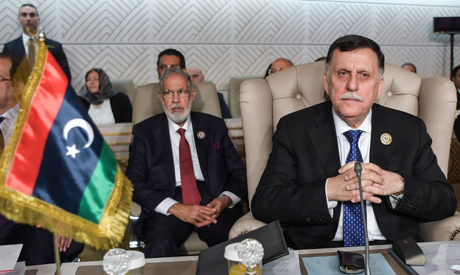
Libyan unity government Prime Minister Fayez al-Sarraj (R), and his Foreign Minister Mohamed Taha Siala (L)
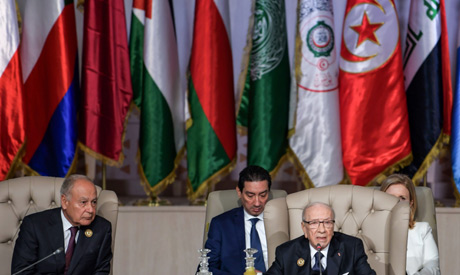
Tunisian President Beji Caid Essebsi (R), chairs the opening session of the 30th Arab Summit
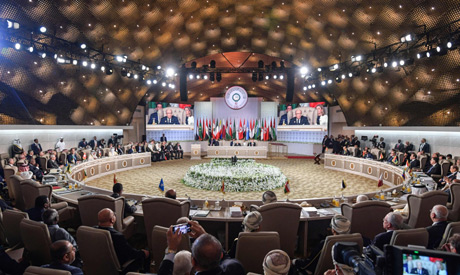
Tunisian President Beji Caid Essebsi chairs the opening session of the 30th Arab Summit
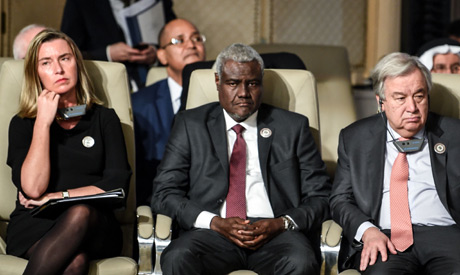
European Union Foreign Policy Chief Federica Mogherini (L), African Union Chairperson Moussa Faki (C) and United Nations Secretary General Antonio Guterres (R)
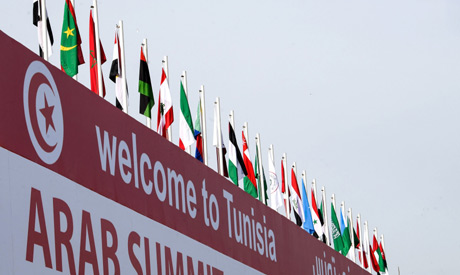
Flags outside the Arab Summit venue in Tunis, Tunisia March 31, 2019
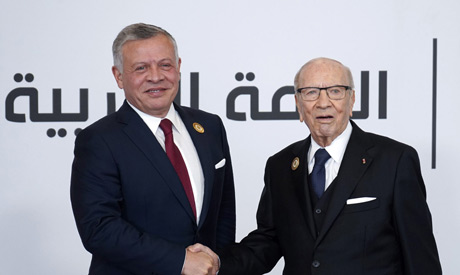
King Abdullah II of Jordan (L) shakes hands with Tunisian President Beji Caid Essebsi
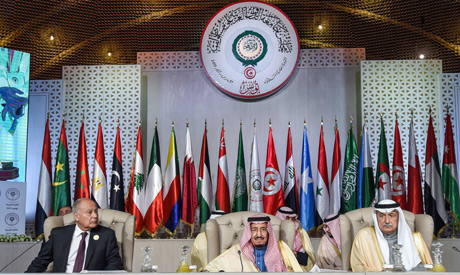
From left, Arab League Secretary-General Ahmed Aboul Gheit, Saudi King Salman bin Abdulaziz, and Saudi Foreign Minister Ibrahim Al-Assaf
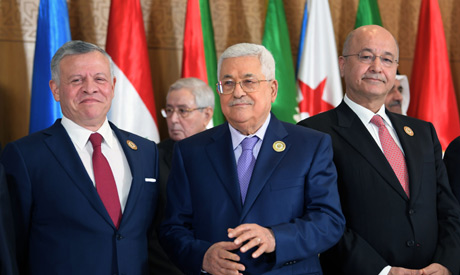
From Left, Jordan's King Abdullah II, Palestinian President Mahmoud Abbas and Iraq's President Barham Salih
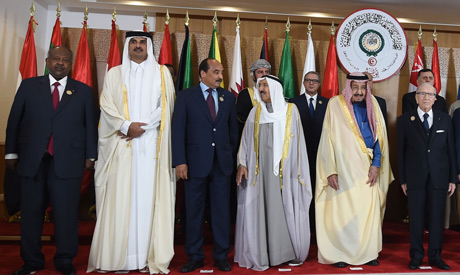
Arab leaders pose for the camera, ahead of the 30th Arab Summit in Tunis
Short link: